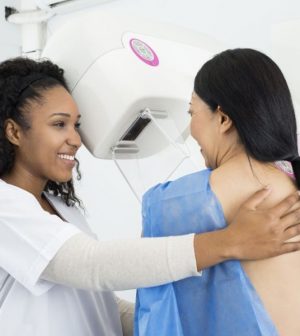- FDA Approves New Antibiotic Against UTIs
- New School Lunch Rules Target Added Sugars, Salt
- Dairy Cows Moved Across State Lines Must Now Be Tested for Bird Flu
- TikTok Riddled With Misleading Info on Health: Study
- Emulsifier Chemicals Are Everywhere in Foods. Could They Raise Diabetes Risk?
- Opioids During Pregnancy May Not Raise Psychiatric Risks for Offspring
- Could Heartburn Meds Raise Your Migraine Risk?
- Drug, Alcohol Abuse Goes Untreated in Many Ex-Prisoners
- Watchdog Group Says U.S. Food Recalls Rose Again Last Year
- Genes Could Mix With Pesticide Exposure to Raise Parkinson’s Risk
Mammogram Centers Must Notify Patients of Breast Density, FDA Says

New U.S. federal regulations will require mammography facilities to tell women if they have dense breasts, a description of how the tissue looks on the X-ray.
It can be more difficult to detect cancer in dense breast tissue on a mammogram. Having dense breasts is also a risk factor for developing breast cancer.
The U.S. Food and Drug Administration update amends regulations issued under the Mammography Quality Standards Act (MQSA) of 1992 (MQSA).
“Today’s action represents the agency’s broader commitment to support innovation to prevent, detect and treat cancer,” said Chief Medical Officer Dr. Hilary Marston.
“Since 1992, the FDA has worked to ensure patients have access to quality mammography,” she said in an FDA news release. “The impact of the Mammography Quality Standards Act on public health has been significant, including a steep decrease in the number of facilities that do not meet quality standards. This means that more women have access to consistent, quality mammography. We remain committed to advancing efforts to improve the health of women and strengthen the fight against breast cancer.”
The update also strengthens the FDA’s oversight and enforcement of facilities and helps doctors better categorize and assess mammograms.
The original act was designed to ensure quality mammography, an important tool for early breast cancer detection.
About half of U.S. women over 40 have dense breast tissue.
The amendments include specific language explaining how breast density can affect the accuracy of mammography. They urge patients with dense breasts to talk to their health care provider about breast density, cancer risks and their individual situation.
Promoting patient access to information about the impact that breast density and other factors can have on breast cancer risk is part of a comprehensive breast health strategy, the FDA said.
The amendments must be implemented within 18 months, FDA said.
They will enhance the agency’s ability to communicate directly with patients and health care providers when a facility is not meeting quality standards and is failing to communicate adequately with patients about that.
The goal is full communication of important information that could affect patient care decisions, such as the need for more screening.
Over a lifetime, about 1 in 8 women will get breast cancer, according to the U.S. Centers for Disease Control and Prevention. Mammograms continue to be the best tool for breast cancer screening and detection, the FDA noted.
More information
The U.S. National Cancer Institute has more on dense breasts.
SOURCE: U.S. Food and Drug Administration, news release, March 9, 2023
Source: HealthDay
Copyright © 2024 HealthDay. All rights reserved.










